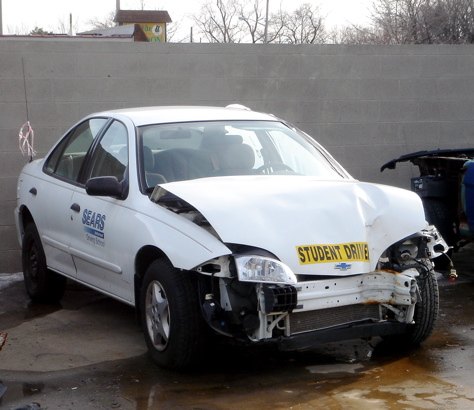Ask The Best And Brightest: Mandatory Driver Education?
Starting this week, the fine citizens of Quebec will be required to take 24 hours of theory and 15 hours of practical driving instruction before getting their driver’s licenses. According to CTV, the provincial government has capped the expense of courses at $825 in order to prevent the cost from becoming too onerous of a burden on new licensees. Still, even in Canadian dollars that’s no chump change. And as instinctive as it is for me to resist this kind of regulation of personal mobility, mandatory driving instruction is common in much of the developing world (i.e. Europe). Moreover, the next time I’m on the interstate having an aneurysm over rampant on-road incompetence (let alone lane etiquette), I’ll approach the idea with a lot less libertarian zeal. Still, unless Ray LaHood (or Oprah?) gets more traction in the War on Distracted Driving, I don’t see the idea catching on in the US. Especially at the prices that Quebec is talking about. Do you think mandatory driver education is a reasonable option in these car-crazed United States?
More by Edward Niedermeyer


































Comments
Join the conversation
Here in Florida, a 15 yo can get a learner's permit. They have to have 40 hours behind the wheel, 10 hours at night, over 1 year. That is an absurdly small amount of real world driving. I know that new drivers can be scary, but in my opini0n its practice, practice, practice. We know parents who drove with their children around the neighborhood occasionally over the permit year, barely getting to the 40 hours, then cut the newly licensed driver loose with a new car at 16. I have 2 older daughters who learned to drive by driving dad EVERYWHERE. My 15 yo son just got his permit, and in the past month he's probably close to the 40 hours already. He'll probably have 400 hours with his permit, all times of the day and night, before he can get his license. I don't think more mandatory education is the answer; how many schools are going to put my son behind the wheel for 400 hours? However, a stricter license exam and much stricter renewal requirements could yield more safety for all of us. Every day there are news reports about some "experienced" driver putting their car through a store front. I haven't had to get behind the wheel of a car for the DMV since 1976, and have only had to have my picture retaken to renew my license over the past 33+ years. How do I even know if my driving skills are up to standards? The DMV should put me through a driving test, minimum, every 5 years.
Israel has this system, and while it works, it's not perfect either. I do think there should be a minimal amount of lessons every new driver has to take prior to taking his test, but they should be well focused and topic-oriented.
First off, your license clearly states whether or not you're permitted to drive a manual or not. You can choose to do a manual license - and subject to a minimum of 28 40-minute long lessons, or do an automatic-only license (with fewer lessons required).
It's not a bad idea. You get to learn the basics of legal, on-paper driving. The problem is that unlike Quebec, Israel doesn't regulate these prices, so one 40 minute session could end up costing you about $30. Then you need to take a test, which costs more than $100, and unlike American driving tests - this one is tough.
The thing is that you don't really learn how to drive until you're out there, on the road, with no second set of pedals to save you or that student sign that lets everyone know who's ahead of them. That's how you should really be doing your driving, save from maybe a few introductory lessons.
The thing is that most people can't face extreme situations. What happens when you get into a turn too quickly? Do you lock the steering wheel and scream? Do you hit the brakes? What's understeer? How does the traction control and stability control systems help you? Most people simply do not know the answers, and this is what driver education should be focused about.
Driving lessons should cover the extremes; the situations most people won't likely be involved at on a regular basis. Take them to a closed, wet track. Show them how it feels to understeer or oversteer, and show them how you stay out of it and escape it alive. Let them do an emergency braking procedure. Most people don't take advanced driving classes because they think it's for "race drivers", and that is simply wrong. Plus, knowing how it feels to slide uncontrollably can psychologically help people avoid getting into these situations in the first place.
It's not a question of a minimal quota of lessons or even the price - the important question is what they teach.
I am very sorry but there is no way I will ever subscribe to the 'driving training does not matter school of thought'. I wonder whether the proponents of this would be perfectly happy to use untrained pilots on commercial flights as well - it's not the skills that matter, yo see, it's the maturity. Do not get me wrong, maturity does play a role in it, as does accumulated experience - and here the earlier the start te better. I posted a link to a study in the last discussion - will mention it here again (it is for motorcycles not cars but the same principle holds) - the optimal age for starting training is not 25, it is 6. In fact the study's conclusion is that starting over the age of 28 is inherently dangerous, irrespective of the mental maturity of the rider. Going back to cars and driver training, I am not sure to what extent you have experienced such but it is not only about going around the course as quickly as possible, not even primarily so. It is about judging your speed relative to circumstances, demonstrating practically how overconfident most people are (about distance, speed, sheer distractedness), teaching you to concentrate on the road and not on texting, phoning or other stuff. The main skills you are taught are about avoiding dangerous situations, knowing how to react in them to get out of them in one piece is valuable but only as a secondary objective. I also know many drivers who as people are extremely mature but will continue doing stupid things in cars for the simple reason that they lack experience, a knowledge of physics (and an intuition about it), all things that in those people would be very easily corrected with some driver training. I am not talking about people who derive any pleasure from speeding but people who will not know how to account for weather, road conditions and the like, which no amount of maturity (unsupported) will prepare you for. I did my licence with a lorry and the first requirement, day one, before they show you a theory book or in fact the lorry, was to pass a phychological aptitude test. You do not pass, you are not allowed to even try, for the simple reason that you do not have the right mindset to drive safely. Apparently the only reason this was not in place for car drivers is that too many would fail. And that is not only true for 18 year olds but equally for 30, 40, 50 and 80 year olds. I can see how something such, in spite of all its benefits will never be introduced - in effect the ship has sailed for it. Had it been put into effect in the 30s and driving never become the right as it is seen today, an alternative structure would evolve to take this into account, as it is, I understand that revoking 2/3 of all licences would be problematic and cause some hardship. I very much applaud all of you who take your kids and actually force them to spend the required time behind the wheel under tutelage (again I agree that this only works if the parent in charge is any good at what they do and suitably mature) - it is one of the things that works. I benefited from such an approach as well - after I got my licence (back home there is no driving on public roads outside of a dual control car with a qualified instructor before you pass your test) I also spent about a year (35k miles or so at least) being the personal chauffeur of my dad, who would, as my skills progressed teach me additional stuff. My first car then came with 240hp (which was a lot for the time) but my driving behaviour was still much less risky than that of any of my friends who had cars with 60-100hp. Blanket generalisations on the power of the car will not really work either. As for regular retesting at 5 year intervals, I am also very much in favour of it. The purpose is to ensure that bad habits did not creep up and if they did, to mandate additional education (or licence limits) to erradicate them. However all of this is probably completely moot, as noone wants their bubble about how they are an 'oh so good driver with 40 years of driving to the store next door without accidents' burst and the fact that people die quite frequently as a result is less of an issue, especially since it is not especially salient in every day life. Well, it's not for those without a proper driver education, who really cannot appreciate the risks at all (shock videos will have a very limited effect, or rather the effect will last a short time - actually losing control of a car in a controlled environment will have a much more lasting impact, especially if one is then made to understand why it occured and how to prevent getting into such a situation again).
DO they lose their license for... Not using turn signals Driving a 4x4 / awd / 4wd vehicle.. with street all season tires? Driving a current vehicle with DRLs without the ability to actually figure out / be taught WHAT DRLs actually mean.. and how to use / turn on lights? Being able to drive the vehicle first.. without ANY distractions I can go on..